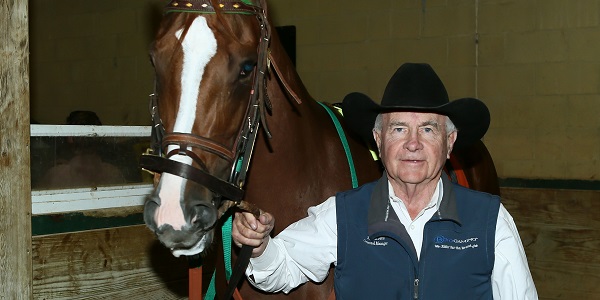BY JIM WELLS
There was a time in his life when he couldn’t get a job. Now he holds down what might be described as several, since one of them must seem sometimes like four or five.
Then again, a cowboy has to be a jack of all trades, or he wouldn’t be of much use to anyone, including himself. If you can’t fix a broken gate, carry an injured calf home draped across the saddle in front of you, or restring a line of barbed wire, you ain’t much good in the ranching world.
Shawn Davis races thoroughbreds around the country, and in those precious few moments between feeding and carrying for a barn full of horses, he puts together, piece by piece, hour by hour, day by day, an annual event staged in Las Vegas called the National Finals Rodeo, an event that draws a sellout crowd for 10 nights running at the Thomas and Mack Arena.
It’s the hottest ticket in town each December, a month in which just about every western hat made _ Stetson, Resistol, Justin et all _ can be spotted in just about any hotel on the strip.
Davis, 76, is also a three-time World Champion saddle bronc rider, so he knows whereof he speaks and advertises. Before that he was national collegiate bareback champion and runner-up in bull riding and the all around. It helped, of course, that he grew up on a ranch and was racing other kids, by the age of six, on horses across the pasturelands of Whitehall, Montana.
He was inducted into the Cowboy Hall of Fame and National Museum of the American Cowboy in Colorado Springs Colo., where one of his saddle bronc buckles is on display.
Thanks to the influence of the silver screen across the nation, many if not most Americans carry in their minds the image of a cowboy as the strong, silent type, taciturn, given more to performing his daily duties than to discussing anything that takes much more than a “yes, ma’am,” or “no sir.”
Here’s an exception to that rule: Davis earned a degree from Western Montana with a triple major in biology, sociology and physical education. Might even be the reason that his colleagues in the world of rodeo figured he might be able to handle the complexities of an enterprise as large as the National Finals Rodeo. Suffice to say, he can carry on a conversation replete with detail, description and nuance on a wide variety of topics.
It was during those college days in Dillon, Montana, in fact, that Davis couldn’t find a job, so he turned to galloping horses and riding match races when someone needed a rider. And they usually came to him.
Davis has been in the cattle and horse business, was head of the equine program at the College of Southern Idaho, where he also coached the rodeo team, producing several individual as well as team national champions.
Somehow or other, he also defied the expectations of doctors and surgeons who told him after a horse flipped over on him that he would never walk again and yet went to the National Finals Rodeo another seven or eight times. “I never could ride as good as before, though,” he recalled.
Naturally, he has met some of the celebrities of the cowboy world and the horse racing industry, too. Carl Nafzger, for instance, who saddled Kentucky Derby winner Unbridled among other equine stars. He was a bull rider at one time. “I’ve known Carl (a member of the Canterbury Park Hall of Fame) for ages.” And, of course, the singing cowboy, Chris LeDoux, a world champion saddle bronc rider who combined that business with cutting country-western tunes. “I knew him real well,” said Davis.
Well enough that some 40 years ago Davis was featured in a documentary that included LeDoux and Sonny Linger discussing the future of the National Finals Rodeo. That future they discussed has become a thriving enterprise, considering the unavailability of anything but tickets in the upper reaches of the auditorium, if even that.
Davis is competing at Canterbury Park for the first time, having come north a couple of weeks ago from Prairie Meadows in Altoona, Iowa. He has seven horses here, but prefers to keep around 18. “I enjoy working that number every morning,” he said. “Any more and it becomes work.”
He galloped his own horses until a couple of years ago when he hired some college kids to take over that task. He insists that staying limber is the key to fighting the advance of time, so he does his fifty pushups every day and hikes or runs the stairs several times. He’ll still pony horses, too.
When Davis heads south after the Canterbury meet closes next Saturday, he will stop in Hobbs, N.M., at Zia Racetrack for awhile before transporting horses back to Phoenix for the eight months of racing at Turf Paradise.
In the meantime, he likes what he’s seen of Shakopee and Canterbury. “I’ve really enjoyed it,” he said. “The weather is good, the people here are very professional and do a good job of marketing. I like how they reach out to young adults and families and have people coming here.”
As a rodeo contestant, Davis was asked frequently to help publicize upcoming events and consequently was schooled in the art of putting people in the stands as a young man.
He must have gotten good grades in those “classes.”
Try getting a seat at the NFR some December.
